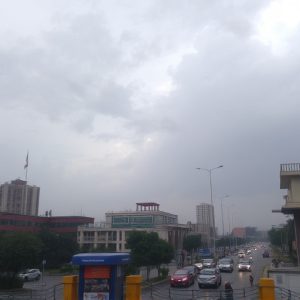Karachi’s Weather Forecast: A 10-Day Climate Outlook
Over the next ten days, Karachi's weather will be dynamic, with meteorologists closely monitor…….

Over the next ten days, Karachi's weather will be dynamic, with meteorologists closely monitoring short-term climate patterns, local atmospheric conditions, Arabian Sea influences, and monsoon systems to provide real-time forecasts that may change as new information emerges, particularly with regard to significant shifts in monsoon activity or temperature fluctuations. Residents are advised to stay informed with regular updates from the Met Department, given the city's summer heat, humidity, and the upcoming potential for rainfall and cooler temperatures during the monsoon season. Looking further ahead over the next ten years, Karachi is expected to experience even more extreme temperature changes, with hotter summers, colder winter nights, and possibly altered monsoon patterns. The city's climate will likely become more challenging, with heightened risks of extreme weather events such as heatwaves and tropical cyclones. Meteorological services and urban planners must closely monitor these developments to ensure the resilience and comfort of Karachi's residents in the long term.
As Karachi’s dynamic weather system continues to evolve, residents and visitors alike seek clear and reliable forecasts to navigate the city’s diverse climatic conditions. Over the next ten days, discerning the day-to-day weather trends is crucial for planning and health. This article delves into the intricacies of Karachi’s short-term climate predictions, providing a comprehensive overview of daily weather patterns, seasonal variations, and precipitation expectations. We will explore the city’s wind dynamics, temperature fluctuations, and humidity levels to help you prepare effectively. Whether you’re a local or a traveler, understanding the upcoming weather trends is key to maintaining comfort and well-being in Karachi’s unique environment.
- Karachi's Short-Term Climate Predictions
- Daily Weather Patterns for Karachi in the Next Decade
- Seasonal Variations and Trends to Anticipate
- Precipitation and Humidity Expectations in Karachi
- Wind Dynamics and Temperature Fluctuations Over the Next 10 Days
Karachi's Short-Term Climate Predictions

When forecasting Karachi’s weather for the subsequent ten days, meteorologists primarily focus on short-term climate patterns and local atmospheric conditions. Given its coastal location in Pakistan, Karachi’s weather can be influenced by both the Arabian Sea and the monsoon systems that traverse the region. The city typically experiences hot and humid weather during the summer months, which can lead to high temperatures. However, the monsoon season brings a respite with increased cloud cover, rainfall, and slightly cooler temperatures.
Predictions for Karachi’s weather over the next ten days are made based on current atmospheric data, including temperature readings, humidity levels, wind patterns, and satellite imagery indicating cloud formation and movement. These predictions are updated regularly to reflect the most accurate information available. For instance, if the forecast suggests a change in the monsoon’s trajectory, there may be a shift towards more rainfall or a slight variation in temperature. It is advisable for residents to monitor these updates as weather conditions can change rapidly, especially during the transition periods between seasons. The Met Department issues advisories and updates which are reliable sources for the latest weather predictions in Karachi.
Daily Weather Patterns for Karachi in the Next Decade

Over the next decade, Karachi’s weather patterns are expected to exhibit a range of fluctuations influenced by both seasonal cycles and long-term climate change trends. The city, situated on the Arabian Sea coast, typically experiences a hot and humid summer from May to October, with daily maximum temperatures often exceeding 35 degrees Celsius. As global temperatures rise, the city’s summers are likely to become even more intense, with longer periods of high heat and potentially higher humidity levels. Conversely, winter in Karachi is relatively mild, with temperatures averaging around 15 degrees Celsius from December to February. However, climate models predict a trend towards colder nights during the winter months, which may necessitate additional heating for residents, especially those in less insulated dwellings.
The monsoon season, from June to September, is characterized by heavy rainfall, which can lead to flooding in low-lying areas of the city. With the projected changes in climate, there may be shifts in the timing and intensity of these rains. This could result in either more severe or less predictable weather patterns during this period, affecting both agriculture in the surrounding regions and the urban infrastructure within the city. Additionally, the increased frequency of extreme weather events globally suggests that Karachi may experience more unusual weather occurrences, such as tropical cyclones or heatwaves, which could have significant impacts on the city’s population and its resilience to weather-related disturbances. It is crucial for local meteorological services and urban planners to monitor these trends closely and adaptively plan for the changing climate to ensure the well-being of Karachi’s residents over the coming years.
Seasonal Variations and Trends to Anticipate

Karachi’s weather is characterized by a distinct monsoon season, with summer temperatures often soaring above 35 degrees Celsius. As one moves through the year, the city experiences a noticeable shift in climate, influenced by its coastal location and proximity to the Arabian Sea. Typically, winter months from December to February bring cooler temperatures with highs averaging around 24 degrees Celsius, though it can be milder near the coast. The summer season, spanning April to June, is markedly hotter, with temperatures that climb steadily until May, often hitting peak heat in June.
Seasonal variations in Karachi are also influenced by the monsoon, which typically begins in late May or early June and continues through July and August. During this period, the city receives most of its annual precipitation, though it’s generally not very heavy. The rains bring a respite from the intense heat but can also lead to localized flooding due to the city’s drainage challenges. As one looks ahead over the next ten days, it is advisable to monitor weather forecasts closely, as the trends observed in previous years can provide guidance on what to expect, such as the likelihood of increasing humidity leading into the monsoon season or the gradual cooling signaling the approach of winter. Trends and patterns, such as the timing of sunrise and sunset becoming earlier or later, can also be indicative of the changing seasons and should be taken into account when preparing for the days ahead in Karachi.
Precipitation and Humidity Expectations in Karachi

In the upcoming ten days, Karachi’s weather is expected to present a mix of conditions with regard to precipitation and humidity. While the city typically experiences a moderate climate, fluctuations in weather patterns can lead to variations in rainfall. Over this period, there may be isolated rain showers, which could provide much-needed relief from the humid air that often envelops the city. The humidity levels are likely to oscillate, with mornings potentially feeling more comfortable as the dew point drops slightly, only to rise again as the day progresses. Residents and visitors alike should be prepared for quick changes in weather during this time, carrying umbrellas or raincoats to stay dry if an unexpected shower occurs.
The atmosphere’s moisture content will also play a significant role in Karachi’s weather over the next decade. While specific humidity levels can vary day by day, the overall trend suggests a continued presence of moisture in the air. This can result in muggy conditions, particularly during the late afternoon and evening hours. The coastal location of Karachi, along with its proximity to the Arabian Sea, contributes to these humid conditions. It’s advisable for individuals to stay hydrated and engage in light activities during the hottest parts of the day to manage the effects of high humidity. Keeping an eye on weather forecasts will help in planning daily activities effectively.
Wind Dynamics and Temperature Fluctuations Over the Next 10 Days

Over the next ten days, Karachi’s weather is expected to exhibit dynamic wind patterns and notable temperature fluctuations. The prevailing winds are likely to shift direction, bringing about changes in humidity levels and potentially altering atmospheric conditions. These shifts can lead to variable weather experiences throughout the period, with some days experiencing gentle sea breezes that provide relief from the heat while others may see stronger gusts as the wind patterns change.
Temperature-wise, Karachi residents should prepare for a range of thermometer readings. The early part of this forecast period might see relatively stable temperatures, but as the days progress, expect significant fluctuations. Daytime highs could climb to their seasonal averages or slightly beyond, while nighttime lows may vary, sometimes dipping lower than usual due to increased wind speeds or cloud cover. These temperature variations are a natural occurrence in the region’s subtropical climate and are influenced by both local geography and the larger-scale atmospheric circulation patterns affecting Pakistan. Residents should stay informed through credible weather sources, as these fluctuations can impact daily activities and comfort levels.
Over the next ten days, residents of Karachi can anticipate a range of weather conditions that reflect the city’s typical climate patterns. With detailed predictions covering daily weather trends, seasonal variations, precipitation levels, humidity, wind dynamics, and temperature fluctuations, individuals can prepare for what to expect. While the forthcoming days may bring both heat and respite from occasional breezes, it is advisable to stay informed as these short-term predictions are subject to change with new climate data. Keeping an eye on local meteorological updates will ensure readiness for any weather eventualities.


